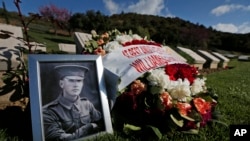Anzac Day commemorations have been held across Australia and New Zealand. In Canberra, 120,000 people attended a dawn service to remember the ill-fated allied landing at Gallipoli in 1915.
To many Australians and New Zealanders the slaughter at Gallipoli in northwestern Turkey saw their fledgling nations come of age.
Both were former British colonies and had gone to war as independent countries for the first time.
The sacrifice and heroism of the Anzacs - the Australian and New Zealand Army Corps - are widely credited with instilling a sense of national self-confidence.
In New Zealand’s capital, Wellington, Australia’s Governor-General Peter Cosgrove said the Anzacs had created unshakeable ties between the Pacific neighbors.
“The bonds that were created there and existed thereafter were built on trust and respect, and a shared experience," Cosgrove said.
"That bond continues to bind our nations together forever in a way that nothing else can. That is the Anzac legacy, and it is what those people did and what they gave us that we commemorate today,” he said.
At Collaroy Beach in Sydney, 100 surfboats came ashore in a symbolic re-enactment of the Gallipoli landings. In the spirit of reconciliation, a Turkish crew also took part before a crowd of several thousand.
Brad Hazzard, a New South Wales government minister, said the Anzacs helped to forge Australia’s national identity.
“Gallipoli cemented where we were as a nation. We were there to fight together for freedom, for democracy and to make sure the world knew that we were certainly a power to be reckoned with, and I think that is where we are now,” he said.
More than 8,700 Australians died at Gallipoli, alongside almost 2,800 New Zealanders. As small countries, they suffered disproportionately high rates of casualties compared to others.
Dawn services and parades were also held. A crowd of more than 100,000 gathered in Canberra, while in Melbourne, there was increased security after last weekend’s police raids that uncovered an alleged terrorist plot targeting Anzac Day events.
There were also solemn services in Turkey to remember the World War I battle. Tens of thousands of Turkish troops died at Gallipoli, alongside others from Britain, France, Ireland and India.








